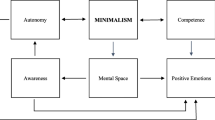Abstract
This study explores cross-cultural differences in why Mohandas (Mahatma) Gandhi is nominated as an historical exemplar of wisdom. We compare the answers of emerging adults (aged 18–30) from three populations: Indian citizens, Canadian citizens, and Indian immigrants to Canada. Chi-square analyses showed that these groups emphasize significantly different aspects of Gandhi’s wisdom: Canadian citizens see Gandhi’s wisdom as practical and intellectual; Indian citizens see Gandhi’s wisdom as practical and benevolent; Indian immigrants to Canada consider Gandhi to integrate benevolent, intellectual, and practical aspects of wisdom; they also differ significantly in attributes associated with their implicit theory about his wisdom. Participants who know more about Gandhi also claim that he had a greater impact on their own lives. These findings suggest that historical exemplars of wisdom are filtered through the sociocultural contexts of each participant’s own lived experience, but that they still can be an inspiration in personally meaningful ways.
Similar content being viewed by others
Notes
The term Mahatma means ‘great soul’, a title given to him for his selfless services to the nation.
Shravana Kumara was the only son of blind parents, whom he carried on a pilgrimage to holy places in two baskets attached to a pole slung on his shoulder, personifying the ideal of duty.
Harishchandra was a king and made enormous sacrifices to keep his word, personifying the ideal of devotion to truth.
For a more complete account of Gandhi’s life and work, see the Gandhi Heritage Portal (https://www.gandhiheritageportal.org).
The principle of nonviolence toward all living things in the Hindu, Buddhist, and Jain tradition.
A term coined by Gandhi from the Sanskrit: “Truth (satya) implies love, and firmness (agraha) engenders and therefore serves as a synonym for force” (Gandhi 1968).
Moksha means freedom from being reincarnated repeatedly in the mundane world where one is under the grip of one’s passions. According to Hindu beliefs, Moksha is one of the fourfold goal of human life.
While we generally share her assessment of this remarkable person, as with virtually all wisdom figures, her choice is not without its critics [see Larivée et al. (2013)].
An entire tradition of psychobiography has explored other figures without claiming that they are wise. And while Erikson himself does not specifically claim to be writing about wisdom, since wisdom is integral to his theory of psychosocial development, it seems a fair inference to consider his psychobiographies as addressing this theme.
Participants in the larger study included 50 Indian citizens from Tamil Nadu recruited from Chennai (formerly Madras) and 25 Indian citizens from Baroda (formerly Varodara), in Gujarat (Gandhi’s home province), recruited through the Maharaja Sayajirao University in Baroda; 50 native-born Canadian citizens and 17 Canadian immigrants from India recruited through the University of Toronto.
The traditional Hindu practice of a widow throwing herself onto her husband’s funeral pyre.
Swatantra is a Sanskrit word composed of two parts, swa and tantra: Swa means self or personal; the meaning of tantra includes (1) governance, rule, or control, (2) support or maintenance as a family, and (3) happiness.
References
Adams, J. (2011). Gandhi: The true man behind modern India. New York, NY: Pegasus Books LLC.
Bluck, S., & Glück, J. (2005). From the inside out: People’s implicit theories of wisdom. In R. J. Sternberg & J. Jordan (Eds.), A handbook of wisdom: Psychological perspectives (pp. 84–109). Cambridge: Cambridge University Press.
Brezina, I., & Ritomský, A. (2010). Opinions of culturally diverse sample of Asians on wisdom. Sociologia, 42, 619–637.
Brown, R. (2010). Gandhi’s spinning wheel and the making of India. New York, NY: Routledge.
Brown, J. M., & Parel, A. (Eds.). (2011). The Cambridge companion to gandhi. Cambridge: Cambridge University Press.
Clayton, V. P., & Birren, J. E. (1980). The development of wisdom across the life span: A reexamination of an ancient topic. Life-Span Development and Behavior, 3, 103–135.
DiSalvo, R. J. (2013). M.K. Gandhi, attorney at law: The man before the Mahatma. Los Angeles, CA: University of California Press.
Erikson, E. H. (1969). Gandhi’s truth: On the origins of militant nonviolence. New York, NY: Norton.
Ferrari, M., Khan, A., Benayon, M., & Nero, J. (2011). Developing wisdom in Islam and Judaism: Two views of Sophia and Phronesis. Research in Human Development, 8, 128–148.
Gandhi, M. K. (1940). The story of my experiments with truth (M. Desai, Trans.). Ahmedabad, Gujarat: Navajivan Publishing House.
Gandhi, M. K. (1968). The selected works of Mahatma Gandhi: Satyagraha in South Africa (2nd ed.)(S. Narayan, Ed., V. G. Desai, Trans.). Ahmedabad, Gujarat: Navajivan Trust
Gandhi, M. (1999). The crime of Chauri Chaura (Young India Feb. 16 1922) in The Collected Works of Mahatma Gandhi (Electronic Book) (Vol. 26, No. 82). New Delhi: Publications Division Government of India. http://www.gandhiserve.org/cwmg/VOL026.PDF.
Gardner, H. (1993). Creating minds: An anatomy of creativity seen through the lives of Freud, Einstein, Picasso, Stravinsky, Eliot, Graham, and Gandhi. New York, NY: Basic Books.
Gardner, H. (1997). Extraordinary minds: Portraits of exceptional individuals and an examination of our extraordinariness. New York: Basic Books.
Glück, J., Bluck, S., Baron, J., & McAdams, D. P. (2005). The wisdom of experience: Autobiographical narratives across adulthood. International Journal of Behavioral Development, 29, 197–208.
Habermas, J. (1970). Knowledge and human interests. Boston, MA: Beacon.
Holliday, S. G., & Chandler, M. J. (1986). Wisdom: Explorations in adult competence. Contributions to Human Development, 17, 100–113.
Ide, S., & Takahashi, M. (2002). Everyday meanings of spirituality and religiosity in the U.S. and Japan: A cross-generational comparison (pp. 107–113). The Bulletin of Health Science University of Hokkaido, School of Nursing and Social Services.
Jason, L. A., Reichler, A., King, C., Madsen, D., Camacho, J., & Marchese, W. (2001). The measurement of wisdom: A preliminary effort. Journal of Community Psychology, 29(5), 585–598. doi: 10.1002/jcop.1037.
König, S., & Glück, J. (2012). Situations in which i was wise: Autobiographical wisdom memories of children and adolescents. Journal of Research on Adolescence, 22, 512–525.
Larivée, S., Chenard, G., & Senechal, C. (2013). Les côtés ténébreux de Mère Teresa. Studies in Religion/Sciences Réligieuses, 42, 319–345.
Lelyveld, J. (2011). Great soul: Mahatma Gandhi and his struggle with India. New York, NY: Knopf.
Nosofsky, R. M. (1992). Exemplar-based approach to relating categorization, identification, and recognition. In F. G. Ashby (Ed.), Multidimensional models of perception and cognition (pp. 363–393). Hillsdale, NJ: Lawrence Erlbaum.
Orwoll, L., & Perlmutter, M. (1990). The study of the wise person: Integrating a personality perspective. In R. J. Sternberg (Ed.), Wisdom: Its nature, origins and development (pp. 160–177). New York, NY: Cambridge University Press.
Parekh, B. (2001). Gandhi: A very short introduction. New York: Oxford University Press.
Paulhus, D. L. (2000). Nominations of intelligent exemplars: Contributions of target achievement and prototype fit. Social Cognition, 18, 319–328.
Paulhus, D. L., & Landolt, M. A. (2000). Paragons of intelligence: Who gets nominated and why. Canadian Journal of Behavioural Science, 32, 168–177.
Paulhus, D. L., Wehr, P., Harms, P. D., & Strasser, D. I. (2002). Use of exemplar surveys to reveal implicit types of intelligence. Personality and Social Psychology Bulletin, 28, 1051–1062.
Sharad, S., & Misra, G. (2013). Living Truthfully: Gandhi’s search for the essence of humanity. GITAM Journal of Gandhian Studies, 2, 369–394.
Sharma, A. (2013). Gandhi: A spiritual biography. New Haven, CT: Yale University Press.
Slate, N. (2006). Mahatma Gandhi memorial. The Journal of American History, 93, 830–833.
Smith, E. R., & Zarate, M. A. (1992). Exemplar-based model of social judgment. Psychological Review, 99, 3–21.
Sowarka, D. (1989). Weisheit und weise Personen: Common-Sense-Konzepte älterer Menschen [Wisdom and wise persons: Common sense concepts of older people]. Zeitschrift für Entwicklungspsychologie und Pädagogische Psychologie, 21, 87–109.
Staudinger, U. M., & Glück, J. (2011). Psychological wisdom research: Commonalities and differences in a growing field. Annual Review of Psychology, 62, 215–241.
Sternberg, R. J. (1985). Implicit theories of intelligence, creativity, and wisdom. Journal of Personality and Social Psychology, 49, 607–627.
Takahashi, M., & Ide, S. (2003). Wisdom of famous people (Unpublished manuscript). Northeastern Illinois University, Chicago, IL, USA.
Takayama, M. (2002). The concept of wisdom and wise people in Japan. Ph.D., Tokyo University, Tokyo.
Weststrate, N. M., Ferrari, M. & Ardelt, M. (2015). The many faces of wisdom: An investigation of cultural-historical wisdom exemplars reveals practical, philosophical, and benevolent prototype (Unpublished manuscript), Toronto, ON, Canada.
Yang, S. Y. (2013). Wisdom and good lives: A process perspective. New Ideas in Psychology, 31, 194–201.
Zagzebski, L. (2015). Exemplars of wisdom and moral theory. Chicago, IL: Talk presented at the Wisdom Research Forum. https://www.youtube.com/watch?v=Wt31Wc6Yz6Q.
Zagzebski, L. (in press). Exemplarist moral theory. New York, NY: Oxford University Press.
Acknowledgments
This research was supported in part by a grant from the Social Science and Humanities Research Council of Canada.
Author information
Authors and Affiliations
Corresponding author
Rights and permissions
About this article
Cite this article
Ferrari, M., Abdelaal, Y., Lakhani, S. et al. Why is Gandhi Wise? A Cross-Cultural Comparison of Gandhi as an Exemplar of Wisdom. J Adult Dev 23, 204–213 (2016). https://doi.org/10.1007/s10804-016-9236-7
Published:
Issue Date:
DOI: https://doi.org/10.1007/s10804-016-9236-7




